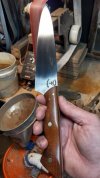A while back I made my Dad a nice chefs knife cpm 154 with stabilized burl handle, dovetail bolsters and a large corby bolt at the rear with a few hidden pins,what I thought was a pretty solid construction and a nice piece I was very happy with and I was sure would hold up for years of use.
Anyway some muppet put it in the dishwasher causing the scales to swell and warp beyond repair, heresy I know and it was the one thing I warned it likely wouldnt hold up to ,though I did think the stabilized wood would hold up a little better but too late now.
Before I replace the scales I was wondering what material may hold up a little better to this henious abuse,I was thinking pakkawood, or maybe corian ,micarta is tough but slightly porous and I fear would suffer the same fate. I thought of aluminium or titainium but was trying to use something less sterile looking with a bit of colour. Also do you think JB weld in place of epoxy would help resist the vile torture of the dreaded dishwasher a little better?
Any advice or experience with drongo resistant handle scale choices?
Anyway some muppet put it in the dishwasher causing the scales to swell and warp beyond repair, heresy I know and it was the one thing I warned it likely wouldnt hold up to ,though I did think the stabilized wood would hold up a little better but too late now.
Before I replace the scales I was wondering what material may hold up a little better to this henious abuse,I was thinking pakkawood, or maybe corian ,micarta is tough but slightly porous and I fear would suffer the same fate. I thought of aluminium or titainium but was trying to use something less sterile looking with a bit of colour. Also do you think JB weld in place of epoxy would help resist the vile torture of the dreaded dishwasher a little better?
Any advice or experience with drongo resistant handle scale choices?

